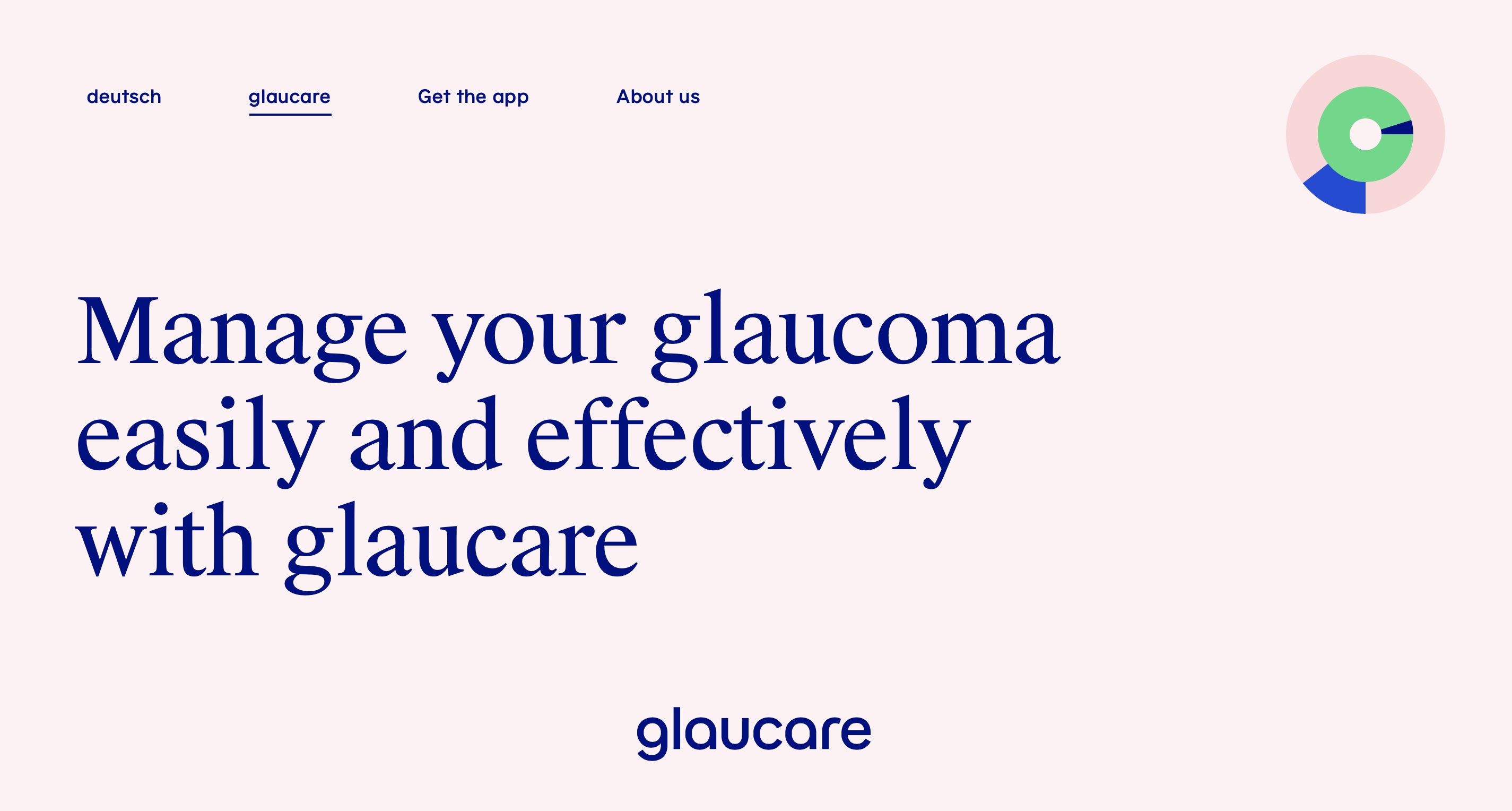Hi Lara,
you work at the start-up Glaucare. Tell us what your mission is!
Hi Sebastian,
We try to protect people worldwide from blindness and improve therapy methods with our simply designed apps. Among other things, we are very interested in glaucoma patients, because the progression of the disease can be easily delayed by early detection and optimal therapy. An inexpensive therapy leads here to very large changes. In addition, we provide international education for a more comprehensive understanding of one's own eye health.
Sounds totally exciting. So basically you want to bundle all glaucoma-related topics for patients and enable better communication between doctors, clinics and patients?
Glaucoma therapy can be quite complex. Often, patients struggle with 2-3 different drop medications that need to be applied at different times each day. In addition, carrying a stack of progress notes from doctor to doctor is no pleasure. Especially forgetting to take eye pressure medication at the right time and the resulting rapid changes in eye pressure cause the most severe optic nerve damage. glaucare facilitates the exchange of data for doctors and patients and brings light into the medication jungle.
Our reminder function and control function ensure that therapy adherence can be checked by the doctor. The patient can motivate himself by small success experiences, data insight and eduction.
Smartphones and smart devices such as smartwatches, fitness trackers, etc. collect a wide range of data, e.g. on sports, exercise, sleep, nutrition, etc. Do you also plan to collect and analyze this data and, for example, relate it to glaucoma progression?
Internally, we are currently working on a very interesting method that can be used to diagnose glaucoma via smartwatches with a very high degree of specificity. Our research results so far are promising and we can't wait to make it available to ophthalmology soon.
How do you see the use of artificial intelligence in this context? Do you think especially if all this data is analyzed, combined and correlated with clinical data, important new insights could be generated?
I am convinced that the digitalization of our healthcare system will contribute a mile-marker to the acquisition of new research insights. It allows us to collect and create large structured databases in a neutral way. Thus, in my view, many bias problems known in research can be circumvented. In addition, digitalization enables a new level of scale for structured databases, as they can be collected in a structured way for each patient outside of studies. This has great potential to observe important new findings and revolutionize the approach in medical practice.
Are there also plans to use your app together with home care devices such as the iCare One or similar? Are there any plans to include methods such as visual fields, optic disc OCT, etc. in the evaluation?
We are researching optimizations in order to be able to detect and treat glaucoma more easily and earlier in the future. For this purpose, diagnostic procedures will be integrated into our app evaluation and combined with each other in an evidence-based manner. In addition, we plan to expand the diagnostic reach of our app to other common conditions.
In glaucoma surgery, we often see that the immediate postoperative period in particular is very crucial, but also very vulnerable. Are you planning to accompany patients immediately after glaucoma surgery via app and offer postoperative support?
Our app glaucare is ideal for the postoperative support of glaucoma patients. The direct exchange with the surgeon can be greatly facilitated. Patients are automatically and easily guided through the necessary postoperative treatment and care. The ophthalmologist can accurately schedule the medication schedule with reminders and checks and closely monitor their execution. The doctor-patient contact can thus be significantly intensified without additional time expenditure.
Doctors are often afraid that apps like Glaucare could lead to glaucoma treatment only being carried out via apps or companies, making doctors replacable. What is your opinion on this?
Our app means time saving, therapy understanding and subjectively higher quality of life for our patients. The doctor is still necessary to control the course and determine therapy. Studies have shown that digital health applications can bring great benefits in combined human contact. The personal physician relationship is still enormously decisive for the success of the therapy. Our standardized algorithms will allow the doctor to focus on the individual patient in a much more personal and individual way. The demand for medical appointments will therefore not be reduced. Quite the opposite. The doctor's appointments become more effective for both sides. Quality of life and prognosis increase significantly.
Let's get back to you personally. You are a medical student, but at the same time actively involved in glaucare. What appeals to you about it and where will your path take you after medical school?
Technology and systematics have fascinated me for a long time. I love being able to creatively find solutions to problems and that "try and error" is possible in our field. In the hospital, a mistake often has horrendous consequences. I am very grateful to be able to participate in the creation of new structures that can solve the problems in the healthcare sector in the long term. In the future, I would like to expand my expertise in the digital health sector and help turn new visions into reality. The digital revolution is a fascinating phenomenon for me and I am grateful to make the new possibilities available to the healthcare infrastructure in a meaningful way.
What particularly appeals to you about working for a start-up? Does direct clinical work no longer offer enough incentives for young medical students?
From my point of view, the lack of patient contact is a great pity! The most important decision points for me are: Flat hierarchical structures, new optimized learning, options to travel, and being allowed to bring new wind to evidence-based algorithms. Sitting in a video call in Cape Town and feeling like you are in the next room to the German team on the other side of the world. Being able to solve problems sustainably with new technology for the big picture, rather than just in your own day-to-day patient interactions. In summary, the high flexibility and creativity and freedom. More opportunities for hybrid models, however, is something I would very much like to see.
How do you rate the start-up landscape in Germany? What are obstacles, where could something be improved?
Since I am still new to this landscape, I lack an overall view from my perspective. In my personal experience, I would like to see more education and inspiration in courses of study that are not primarily business-oriented, such as medicine. I think that ignorance of business and organizational fundamentals, as well as investment options for many great visions outside of business oriented structures can currently still be a major barrier.
In your opinion, do universities provide enough infrastructure to support start-ups and make spin-offs easier for students and physicians?
From my point of view, information about start-up options and digital health is unfortunately still strongly underrepresented at German universities for human medicine. I only learned about these options through my friends who work in this field. It was very rarely discussed with my fellow students.
Two questions I asked Stefan Zundel from Dopavision the other day, I would also like to ask you, since you have another point of view:
In Germany, it is always demanded that startup founders devote 100% of their time to the startup. I have often seen that in the case of health startups, the advice of female doctors and contact with clinics is sought externally. Wouldn't it be desirable here for donors to provide more support, especially for startups in which the founders are still working in the clinic and are thus closer to the later target group?
I have often experienced in the university environment that young scientists have great ideas, but these are only pursued until publication (goal habilitation, professorship, etc.). In this context, I once called for the creation of the clinician founder, analogous to the clinician scientist (a mixture of researcher and clinician). By this I mean, as mentioned above, clinicians who found or participate in the founding of a start-up in addition to their clinical work in order to develop DiGAs, for example, and who could also directly transfer research results into clinical application. This could also be done directly by universities in the form of "start-up" grants. Here, sums of 5000-10000 Euros are sometimes sufficient to create a website, build a prototype or have time for a good business plan. What do you think about this?
From my point of view it would be great to be able to create stronger funding for hybrid models between theoretical creative problem improvement and direct practical application. In my view, there is a great potential to perfect products with high efficiency and excellent expertise and to further develop them in an application-oriented way. I find your proposal for the implementation of "start-up" grants very interesting! Thus, on the one hand, doctoral students could come into contact with start-up options and practice orientation at an early stage during their studies and be inspired. On the other hand, experienced researchers can contribute expert knowledge and experience over a much longer period of time in a motivated way. In my view, this can raise the quality of innovations to a new level.
Thank you very much Lara!!!
Further Links:




